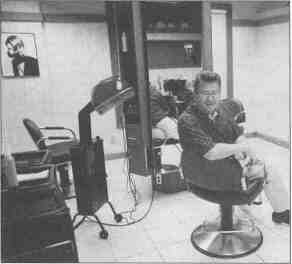 |
Home | Search | Browse | About IPO | Staff | Links |
 |
Home | Search | Browse | About IPO | Staff | Links |
Innovations
Bernie Koch of Springfield uses his salon a block from the Capitol in Springfield not only for some of the state's who's who, but also to help women in the nearby Sojourn House feel more attractive. Businessman helps people without power feel more attractive Image is power. As the owner of a high-end beauty salon one block from the state Capitol, Bernie Koch sees that truism played out every day. He is instrumental in helping a number of prominent women and men look their best. "Attractive people get the breaks," says Koch. He feels politicians are a clear reflection of our culture's belief that power and beauty go hand in hand. But Koch isn't satisfied with making the who's who along the brass rail look good. He reaches out to people who have no power. He found them at Sojourn House, a shelter for battered women in Springfield. "All people have the potential for being attractive," says Koch. His program for Sojourn House has one goal: to provide the women with a positive experience. Many of his clients from Sojourn, he says, have a history of failures and of being told they are not attractive. Koch and his assistants try to help the women regain self- esteem through an improved self-image. According to Ann Tavender, one of Koch's Sojourn clients, Koch does just that. "Bernie is responsible for my getting back into the world. Now I know I look good, and I feel confident about being out in public again." Tavender went to Sojourn House after being hospitalized from a beating by her boyfriend. She is now on her own and ready to join the workforce again. Koch says his program concentrates on helping women learn how to look attractive and how to re-create that look for themselves. But Koch's advice goes beyond hair styling, makeup and nails. He starts by getting women to visualize where they want to be, then teaches them about the uniform of that job. "All jobs have uniforms," says Koch. "The uniform of a supervisor is different from that of a clerk. If you want to be a supervisor, you have to dress and carry yourself like a supervisor." Part of the training is mastering a confident, solid handshake and making eye contact. Koch has helped 46 women in the past two years make the transition from the shelter to self-reliance.
In the Saving Your Tax Dollars category... In a total state budget of $33.37 billion, a few thousand could be seen as a proverbial drop in the bucket. Nevertheless, it should be noteworthy when an agency of government tries something new that saves money, our money, especially when sticking with the status quo is easier and offers little risk of criticism. Beginning last June, after a two-year study, 2, 396 ISP fleet vehicles began using synthetic motor oil. Director Terrance W. Gainer estimates the savings for fiscal year 1995 will be more than $300, 000. Most of the savings come from the extended length of time between oil changes: 15, 000 miles for synthetic oil compared to 3,000 miles for patrol cars using regular motor oil (5,000 miles for all other vehicles in the police fleet). With fewer changes required, the savings are realized through a decrease of work hours, oil and filters used. Added to those savings are other dollars accrued through lower costs for unscheduled repairs and vehicle replacements due to extended engine life. Studies showed using the synthetic oil also resulted in an overall 1 percent increase in gas mileage. The synthetic oil can be recycled with regular oil so there is a long- range environmental bonus, too.
Beverley Scobell
|
|
Sam S. Manivong, Illinois Periodicals Online Coordinator Illinois Periodicals Online (IPO) is a digital imaging project at the Northern Illinois University Libraries funded by the Illinois State Library |